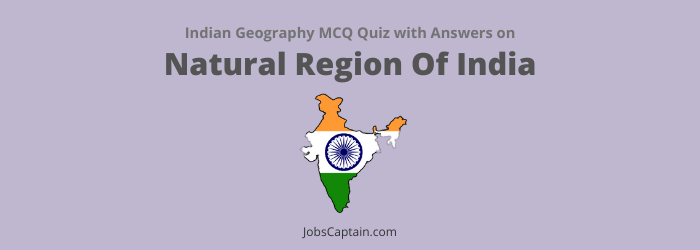
| Return To | Indian Geography MCQ | |
Question 1. In which part of Uttarakhand are artisian wells found?
(A) Bhabhar
(B) Shivalik Hills
(C) Tarai
(D) None of the above
Question 2. India is divided into how many Natural Territories?
(A) 8
(B) 7
(C) 6
(D) 4
Question 3. The Indian subcontinent was originally part of a huge mass called
(A) Gondwana Continent
(B) Indiana
(C) Aryavarta
(D) Jurassic land mass
Question 4. The paleomagnetic results obtained from India indicate that in the past, the Indian land mass has moved
(A) Westward
(B) Eastward
(C) Southward
(D) Northward
Question 5. Kuttanad (or Kuttanadu) of Kerala is famous for___________.
(A) The Westernmost point of India
(B) A coral island
(C) The region with the lowest altitude in India
(D) A fresh water lake
Question 6. Which of the following statement is incorrect?
(A) Gondwana rocks have the largest reserve of coal in India
(B) The Western coastline of India is formed by the deposition process of the rivers
(C) Himalaya mountains demonstrate the most newly developed folded mountains in the world
(D) Geologically Peninsula region is India’s most ancient part
Question 7. Consider the following statements regarding formation of landforms in India.
- Structurally, the Meghalaya plateau is an extended part of the Deccan plateau.
- The Valley of Kashmir was formed in a synclinorium.
- The Gangetic plain was formed in a fore deep.
- The Himalayas originated as a result of triangular convergence of the Indian plate, the European plate and the Chinese plate.
Which of these statements are correct?
(A) 2 and 4
(B) 1 and 3
(C) 1, 3 and 4
(D) 1, 2 and 3
Question 8. Match List-I with List-II and select the correct answer using the code given below the lists.
| List-I | List-II |
| (a) Deccan Traps | 1. Late cenozoic |
| (b) Western Ghats | 2. Pre-cambrian |
| (c) Aravalli | 3. Cretaceous Eocene |
| (d) Narmada – Tapti alluvial deposits | 4. Cambrian |
| 5. Pleistocene |
Question 9. If there were no Himalayan ranges, what would have been the most likely geographical impact on India? Which of the statements given above is/are correct? (A) 1, 2 and 3 (B) Only 2 and 3 (C) Only 1 and 3 (D) Only 1
(a)
(b)
(c)
(d)
(A)
3
5
1
4
(B)
3
1
2
5
(C)
2
1
3
4
(D)
1
4
2
5
Return To
Indian Geography MCQ
